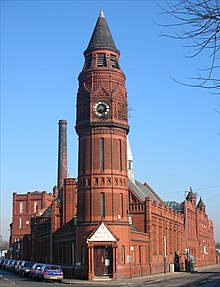Green Lane Masjid
| Green Lane Masjid | |
|---|---|

The Masjid, formerly Green Lane Public Library and Baths (Martin & Chamberlain 1893-1902)
|
|
| Basic information | |
| Location | Small Heath, Birmingham, England |
| Geographic coordinates | 52°28′23.30″N 1°51′50.90″W / 52.4731389°N 1.8641389°WCoordinates: 52°28′23.30″N 1°51′50.90″W / 52.4731389°N 1.8641389°W |
| Affiliation | Ahle Hadith |
| Country | United Kingdom |
| Website | www |
| Architectural description | |
| Architect(s) | Martin & Chamberlain |
| Architectural style | Gothic-Jacobean style |
| Completed | 1893/1902, 1970s |
| Designated as NHL | |
|
Listed Building – Grade II
|
|
| Designated | 8 July 1982 |
| Reference no. | 1211476 |
| Listed Name | Small Heath Public Library and Baths |
Green Lane Masjid & Community Centre (GLMCC), is a mosque in Birmingham, linked to the Ahl-i Hadith Salafi movement. Established in the 1970s, it has been a registered charity in England since 2008.
Each year Green Lane Masjid facilitates an Eid al-Fitr celebration in Small Heath Park along with five other local mosques. This was attended by 88,000 people in 2016.
The Masjid occupies a prominent corner site in Green Lane, Small Heath, Birmingham. One of the buildings was originally constructed as a public library and baths, designed by local architects Martin & Chamberlain and built in the redbrick and terracotta Gothic-Jacobean style between 1893 and 1902. It is a Grade II listed building. The complex includes prayer halls for men and women, a community hall, madrasah, library, shop, and some accommodation. It also provides funeral services to the local Muslim community.
The Green Lane Masjid was one of the mosques featured in Channel 4's 2007 Dispatches programme Undercover Mosque, which investigated religious extremism in British mosques, including preachers advocating violence, anti-Semitism, sexism, and homophobia.West Midlands Police subsequently carried out an investigation into whether criminal offenses had been committed by those preaching or teaching at the mosque, and believed there was a case to answer. However, the Crown Prosecution Service (CPS) ruled that "a realistic prosecution was unlikely".
The police subsequently investigated the programme itself and submitted a report to Ofcom on the basis of "unfair editing" designed to misrepresent the subjects of the programme, but Ofcom ruled that there was no case to answer and that it was a "legitimate investigation." Both Channel 4 and the programme makers sued the CPS for libel, and settled for a payment of £100,000.
...
Wikipedia
